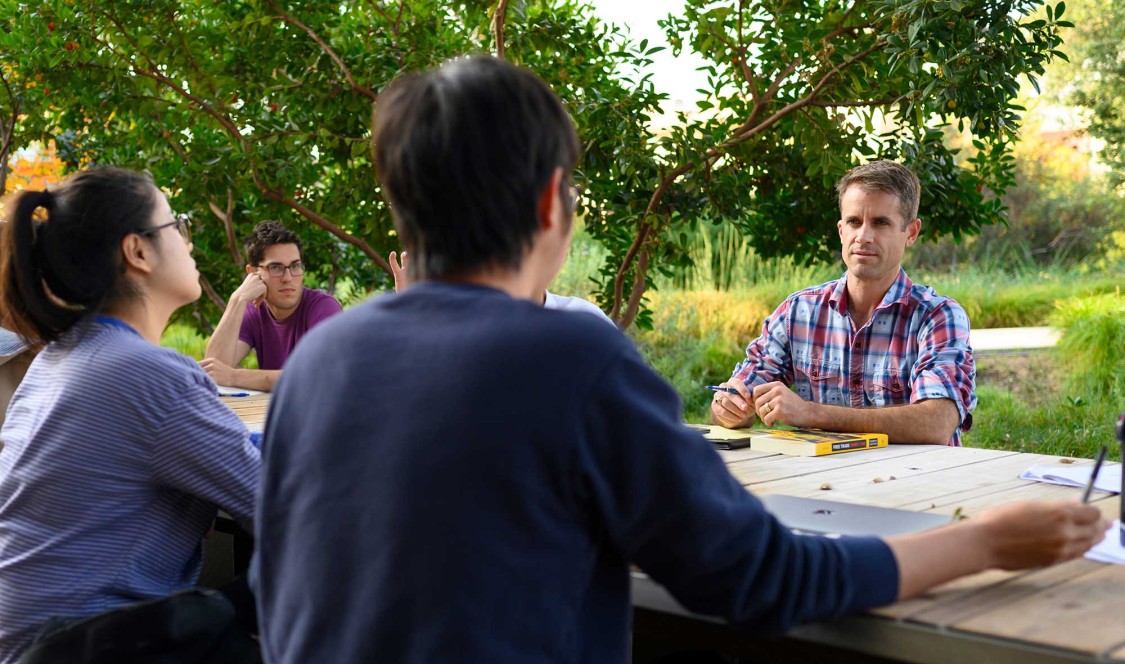Professor Cameron Shelton, Director of the Lowe Institute for Political Economy, viewed the recent election as a prime opportunity to fuel his teaching and research and foster open-minded dialogue in class and on campus.
Shelton recently shared what he is excited about from a research perspective and the impact he hopes to have on CMC’s campus commitment to promoting responsible leadership.
Studying Campaign Ad Impact
Professor Cameron Shelton’s recent study, “Mobilization and Backlash: Asymmetric Updating in Response to Campaign Ads,” shows that televised campaign advertising increases the probability that viewers who identify with a particular political party will embrace its positions, prefer its candidates, and turn out to vote. However, an ad will provoke an equally powerful negative response from viewers who oppose the party sponsoring the ad. This backlash means campaigns gain very little when showing ads to a balanced audience, implying that targeting one’s supporters is key. His research, published in the Review of Economics and Statistics, examined the impact of 5.68 million television advertisements from the 2012 and 2016 federal election cycles on election results.
What is the goal of your study, “Mobilization and Backlash: Asymmetric Updating in Response to Campaign Ads,” published in the Review of Economics and Statistics, and your research on how household consumption is influenced by election outcomes?
One of the questions of campaign ads is whether they inform voters, whether they actually persuade and change minds, or simply activate preexisting viewpoints and raise turnout. Seeing as this is a major channel of direct communication between representatives and voters, understanding that communication is crucial to understanding the formation of voters’ preferences and ability to judge and oversee their representatives. It is a key link in the channel of democratic accountability. And my study shows that it doesn’t quite work as expected!
My ongoing research on election outcomes and consumption illuminates how people process and respond to election outcomes—how it affects their economic behavior. In this instance, it’s about understanding the effects of an election as an economic shock in and of itself. Yes, the election might change the party in power and thus policy. But the sheer fact of holding an election, whatever the outcome, also has consequences. This connects to a long tradition of psychological effects on macroeconomic behavior going back to British economist John Maynard Keynes.
How do you involve CMC Lowe students in your research? Do conversations with your students influence your methods and/or topics?
Every year I try to think of some projects that I can turn over entirely to students for senior thesis projects. I often suggest shorter projects to the Economic Journalists group at the Lowe Institute. Conversations with students are often useful in finding holes at an early stage because they are eager to understand and are unashamed to ask questions, which often leads you to realize you don’t have good explanations! By requesting a full explanation, students help find weaknesses.
You have planned a community dialogue exhibit this fall semester through the Lowe Institute, asking students to respond to the prompt, “I think it is important to listen to others’ point of view because …” How was this project influenced by this being an election year?
Disciplinary coursework, especially in the social sciences, is designed to equip students with the tools of discernment. Along with many of my fellow faculty, I work hard to encourage open-mindedness in the classroom. But in many ways, open-mindedness must also be practiced in the broader space as we grapple with societal questions and bring our carefully honed tools of analysis and discernment to arguments beyond any single classroom. We must be open to a different set of assumptions, maybe a different disciplinary lens, a different lived experience.
Certainly, the higher the stakes, the harder we all find it to remain open-minded. An election year like this one is an opportune moment to reinforce this communal value.
This story was originally published in the Fall 2024 issue of the CMC magazine.

